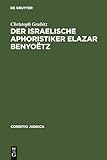Der israelische Aphoristiker Elazar Benyoëtz / Christoph Grubitz.
Material type: TextSeries: Conditio Judaica : Studien und Quellen zur deutsch-jüdischen Literatur- und Kulturgeschichte ; 8Publisher: Tübingen : Max Niemeyer Verlag, [2011]Copyright date: ©1994Description: 1 online resource (213 p.)Content type:
TextSeries: Conditio Judaica : Studien und Quellen zur deutsch-jüdischen Literatur- und Kulturgeschichte ; 8Publisher: Tübingen : Max Niemeyer Verlag, [2011]Copyright date: ©1994Description: 1 online resource (213 p.)Content type: - 9783484651081
- 9783110944594
- 840.9354
- PT2662.E56 .D384 1994
- online - DeGruyter
- Issued also in print.
| Item type | Current library | Call number | URL | Status | Notes | Barcode | |
|---|---|---|---|---|---|---|---|
 eBook
eBook
|
Biblioteca "Angelicum" Pont. Univ. S.Tommaso d'Aquino Nuvola online | online - DeGruyter (Browse shelf(Opens below)) | Online access | Not for loan (Accesso limitato) | Accesso per gli utenti autorizzati / Access for authorized users | (dgr)9783110944594 |
I-X -- Einleitung -- 1 Reflexion auf Sprachmagie und Moralistik: Benyoëtz’ poetische Verfahrensweisen -- 2 Sprachwitz in theologischen und poetologischen Zusammenhängen: Benyoëtz’ Sujets -- 3 ‘Einsatz’, Buchtyp und Gattung: Benyoëtz’ Auffassung der literarischen Aphoristik -- Literaturverzeichnis -- Anhang: Elazar Benyoetz: ICHMANDU oder: Was nicht trifft, kommt nicht an. Briefe an Christoph Grubitz 1987 bis 1992
restricted access online access with authorization star
http://purl.org/coar/access_right/c_16ec
Ihre einst dominante Rolle in den Gattungssystemen der europäischen Literatur hat die literarische Aphoristik eingebüßt. Diese Studie will begründen, warum zeitgenössische Aphoristik traditioneller Art oft epigonal ist, und zeigen, wie der Dichter Elazar Benyoëtz mit ihren Konventionen bricht. Denn wie in ungleich breiteren Strömungen der jüngeren Philosophie wird in Benyoëtz' Werk der individuelle 'Andere' gegenüber dem 'Selbst' aufgewertet. Wird 'der Andere' in der traditionellen Aphoristik vorwiegend über die Entlarvung kollektiver Klischees angesprochen, so nutzt Benyoëtz dieses Individualisierende aphoristischer Rede zu einer Individualisierung 'des Anderen'.
The once dominant role played by the art of aphorism in the various genres of European literature is a thing of the past. The present study sets out to show why traditional contemporary aphoristic writing is frequently derivative and how the poet Elazar Benyoëtz breaks with the conventions prevailing in it. Of significance here, as in the much broader currents of contemporary philosophy, is the way in which the individual 'other' attains a new status over and against the 'self' in Benyoëtz' work. Whereas in traditional aphoristic writing the 'other' is largely addressed via the unmasking of collective clichés, Benyoëtz draws upon the individualising elements of aphoristic discourse to achieve an individualisation of the 'other'.
Issued also in print.
Mode of access: Internet via World Wide Web.
In German.
Description based on online resource; title from PDF title page (publisher's Web site, viewed 28. Feb 2023)


